With Parliament at loggerheads over Brexit and Theresa May battling to get a deal approved, calls have intensified for a so-called People’s Vote.
WATCH: The Gov is fast running out of excuses not to hold a #PeoplesVote.
It's time they put Brexit back to the people. Please RT: pic.twitter.com/lD2Lo9PAoA
— People's Vote UK (@peoplesvote_uk) April 5, 2019
Here's how another referendum could work.
– What is the People’s Vote?
Remain supporters including actor Sir Patrick Stewart and MPs Anna Soubry and Chuka Umunna launched the campaign in April last year – less than two years after 52% of voters chose to Leave.
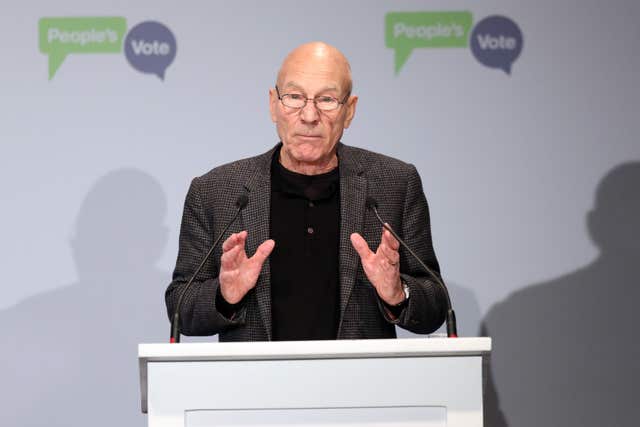 Sir Patrick Stewart backs the People’s Vote campaign (Jonathan Brady/PA)
Sir Patrick Stewart backs the People’s Vote campaign (Jonathan Brady/PA)
Campaigners from across traditional party lines are calling for a second referendum on EU membership.
READ MORE: Brexit: What happens if the UK crashes out of the EU without a deal
They argue that the public deserves to make the decision over whether the Government’s Brexit deal is the right choice.
The leaderships of the two main parties have been marred by division and incompetence. The only way to break the impasse is to put Brexit back to the people in a People's Vote. pic.twitter.com/lk2JRnetjZ
— Chuka Umunna (@ChukaUmunna) April 5, 2019
They also believe a new vote could break the deadlock in Westminster.
– Who would decide whether to hold a vote?
That is in the hands of Parliament. MPs would have to pass legislation to approve a fresh vote and set a date for it.
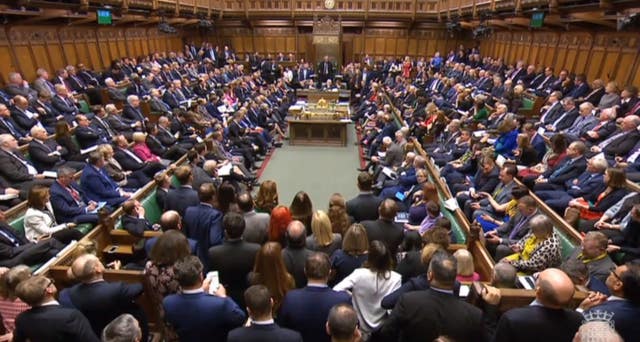 MPs at Westminster (House of Commons/PA)
MPs at Westminster (House of Commons/PA)
But that is not all they would be tasked with…
– What would a second referendum ask?
Voters were asked to decide whether the UK should remain a member of the EU or leave the bloc during the June 2016 referendum.
READ MORE: Ian Blackford threatens to sue Ross Thomson over 'arms dealer' comment
How this was phrased was subject to fierce debate. So too would the question for any future referendum.
MPs would have to hammer out what the public would be asked to reach a fair result.
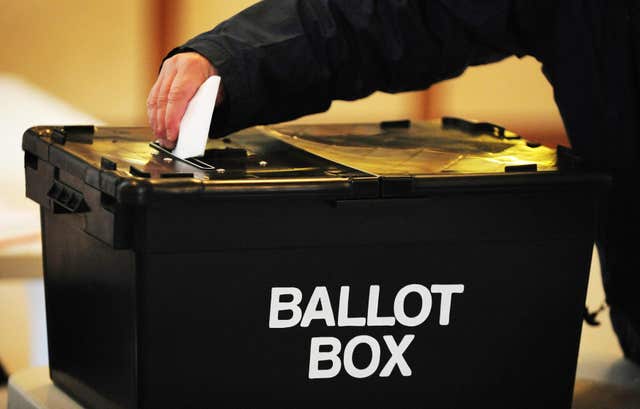 (Rui Vieira/PA)
(Rui Vieira/PA)
Ballot slips could include the following options in various arrangements:
– take the current deal and leave
– depart with no deal
– negotiate a new deal
– stay in the EU
– How likely is a fresh vote?
After the 2016 result, few were saying a second vote was likely. The Conservatives and Labour campaigned during the following year’s general election on manifestos that pledged to uphold the referendum result.
But much has changed since then. Labour has thrown its weight behind the campaign for a second vote.
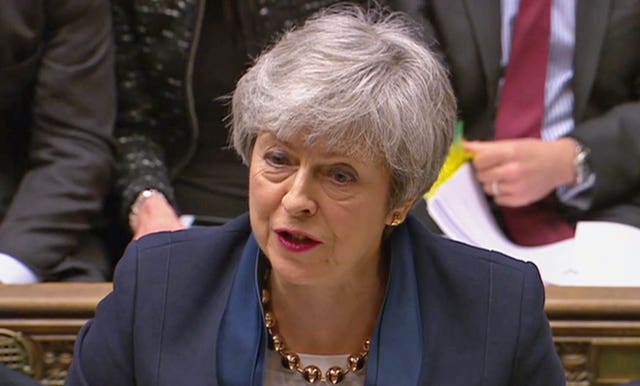 Theresa May (House of Commons/PA)
Theresa May (House of Commons/PA)
Mrs May has repeatedly insisted she is against the idea, but the Prime Minister is now talking to Jeremy Corbyn to seek a compromise so she can pass a deal.
– Who is in favour of one?
Mr Umunna quit Labour and Ms Soubry defected from the Tories along with Sarah Wollaston and Heidi Allen to form the Independent Group, largely because of their support for a fresh vote.
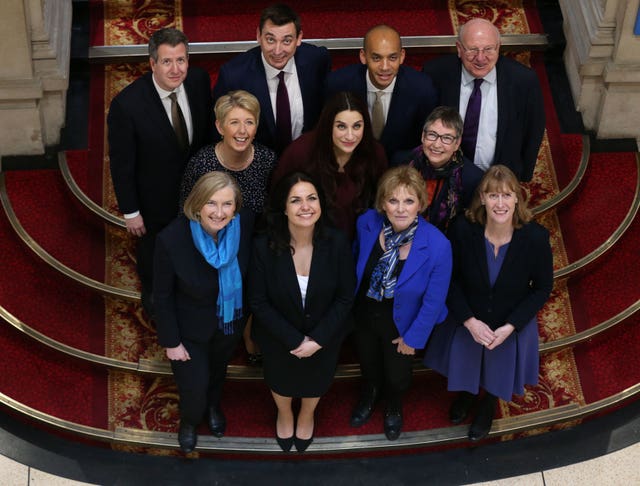 Independent Group MPs (Jonathan Brady/PA)
Independent Group MPs (Jonathan Brady/PA)
Amid pressure from Labour Party members, Mr Corbyn signalled support for a new referendum.
Former minister Justine Greening is among the Conservatives who back the move despite their party’s stance, as is former attorney general Dominic Grieve.
READ MORE: People's Vote on Brexit 'most likely outcome'
The Scottish National Party, the Liberal Democrats and the Green Party are also supporters.
– And against?
Mrs May’s Government is officially against a confirmatory vote.
Leading Brexiteers such as Jacob Rees-Mogg and Boris Johnson are vehement opponents.
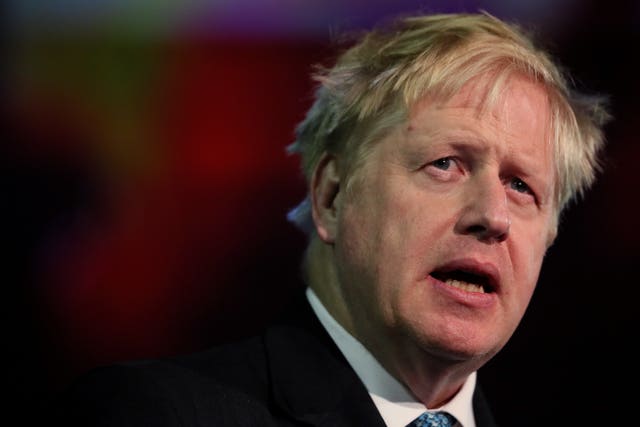 Boris Johnson (Brian Lawless/PA)
Boris Johnson (Brian Lawless/PA)
The Labour ranks are also not unanimous. Veteran backbenchers Sir Kevin Barron and Dennis Skinner and former minister Caroline Flint were among 25 Labour MPs who wrote a letter warning Mr Corbyn against a second public vote.
They said it would “divide the country further and add uncertainty for business”.
The party must also walk a political tightrope, with many traditional voters backing Brexit.



Why are you making commenting on The Herald only available to subscribers?
It should have been a safe space for informed debate, somewhere for readers to discuss issues around the biggest stories of the day, but all too often the below the line comments on most websites have become bogged down by off-topic discussions and abuse.
heraldscotland.com is tackling this problem by allowing only subscribers to comment.
We are doing this to improve the experience for our loyal readers and we believe it will reduce the ability of trolls and troublemakers, who occasionally find their way onto our site, to abuse our journalists and readers. We also hope it will help the comments section fulfil its promise as a part of Scotland's conversation with itself.
We are lucky at The Herald. We are read by an informed, educated readership who can add their knowledge and insights to our stories.
That is invaluable.
We are making the subscriber-only change to support our valued readers, who tell us they don't want the site cluttered up with irrelevant comments, untruths and abuse.
In the past, the journalist’s job was to collect and distribute information to the audience. Technology means that readers can shape a discussion. We look forward to hearing from you on heraldscotland.com
Comments & Moderation
Readers’ comments: You are personally liable for the content of any comments you upload to this website, so please act responsibly. We do not pre-moderate or monitor readers’ comments appearing on our websites, but we do post-moderate in response to complaints we receive or otherwise when a potential problem comes to our attention. You can make a complaint by using the ‘report this post’ link . We may then apply our discretion under the user terms to amend or delete comments.
Post moderation is undertaken full-time 9am-6pm on weekdays, and on a part-time basis outwith those hours.
Read the rules hereLast Updated:
Report this comment Cancel